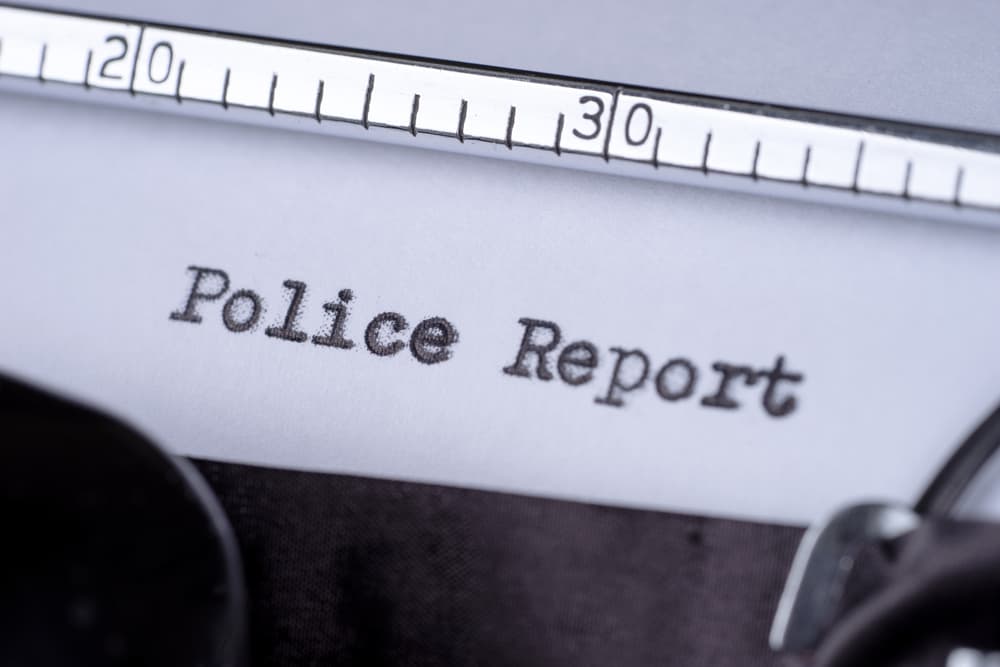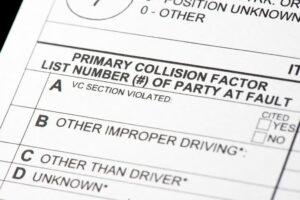Do I Need to File a Police Report if I Was in a Truck Accident?

It’s natural to feel overwhelmed and unsure of what steps to take after a truck accident. One crucial step that accident victims often overlook is filing a police report. But do you really need to file a police report if you were in a truck accident?
The answer is a resounding yes. You need to file a police report for several reasons, and it can greatly benefit you in the long run.
In this article, we will discuss the importance of filing a police report after a truck accident, what information to include in the report, and common misconceptions about this process.
If you or a loved one is injured in a truck accident, reach out to a skilled truck accident lawyer to ensure you receive the compensation and justice you deserve.
Importance of Filing a Police Report
Filing a police report after a truck accident is vital for various reasons. To start, it helps establish an official record of the incident. The police report will include important details such as the date, time, and location of the accident, as well as the parties involved.
This documentation provides an unbiased account of what occurred and can serve as valuable evidence when dealing with insurance companies or pursuing legal action.
Next, a police report can help determine fault. Law enforcement officers are trained to assess the scene of an accident and gather evidence to determine who was at fault.
Their objective analysis can provide an objective perspective on the matter, which can be crucial when it comes to negotiating with insurance companies or presenting your case in court.
Finally, filing a police report ensures that all relevant information is properly documented. This includes witness statements, insurance information, and any other pertinent details.
Having all the necessary information in one place can streamline the claims process and help prevent any discrepancies or misunderstandings.
What Information to Include in a Police Report for a Truck Accident
When filing a police report for a truck accident, include as much detailed information as possible, like:
- Personal information: Provide your full name, contact information, and driver’s license number. Also, gather the same information from the other parties involved in the accident.
- Accident details: Describe the accident in detail, including the date, time, and location. Provide a clear and concise account of what happened leading up to the accident, during the accident, and immediately afterward. Include any significant factors such as weather conditions, road conditions, and traffic signals.
- Witness statements: If there were any witnesses to the accident, gather their contact information and ask them to provide a statement. Witnesses can provide valuable insight into what transpired and help corroborate your version of events.
- Photos and evidence: If possible, take photos of the accident scene, the vehicles involved, and any visible injuries. Collect any other evidence such as skid marks or debris that may help establish fault.
- Insurance information: Exchange insurance information with the other parties involved in the accident. This includes their insurance company name, policy number, and contact information.
- Police officer information: Note the names and badge numbers of the police officers who respond to the accident. This information will be useful if you need to follow up on the report or request a copy later on.
Including all of this information in the police report will ensure a comprehensive and accurate record of the truck accident.
Common Misconceptions About Filing a Police Report After a Truck Accident
There are some common misconceptions surrounding the filing of a police report after a truck accident.
Let’s address these misconceptions to provide a clearer understanding of why filing a police report is crucial.
Misconception 1: “The accident was minor, so I don’t need to involve the police.”
Even if the accident seems minor, it’s still important to involve the police. Some injuries or damages may not be immediately apparent, and having an official record can protect you in case complications arise later on.
Misconception 2: “I can just rely on my insurance company to handle everything.”
While your insurance company will play a role in the claims process, a police report provides an unbiased account of the accident. This can be valuable if there are any disputes or discrepancies in the future.
Misconception 3: “The other party admitted fault, so there’s no need for a police report.”
Verbal admissions of fault can be unreliable, and it’s always better to have an official record. A police report will provide an objective assessment of the accident and help establish liability.
Filing a police report can protect your rights, establish fault, and properly document all relevant information.
Don’t underestimate the importance of this document after a truck accident.
Steps to Take When Filing a Police Report for a Truck Accident
 Filing a police report after a truck accident may seem daunting, but it doesn’t have to be.
Filing a police report after a truck accident may seem daunting, but it doesn’t have to be.
Here are the steps you should take when filing a police report:
- Ensure everyone’s safety: Before anything else, make sure you and others involved in the accident are safe. If there are any injuries, call for medical assistance immediately.
- Contact the police: Dial the emergency number or the non-emergency police line to report the accident. Provide them with accurate details about the accident, including the location and any injuries.
- Cooperate with the police: When the police arrive at the scene, provide them with all the necessary information they require. Be honest and straightforward in your account of what happened.
- Obtain a copy of the report: Once the police have completed their investigation, request a copy of the police report for your records. You need this document when dealing with insurance companies or seeking legal representation.
By following these steps, you can ensure that the police correctly and efficiently file the report.
Benefits of Filing a Police Report for a Truck Accident
Filing a police report after a truck accident offers several benefits.
Let’s explore some of these benefits:
- Legal protection: A police report provides legal protection by documenting the accident and its details. It serves as an objective record of the incident and can be used as evidence in legal proceedings.
- Insurance claims: Filing a police report helps streamline the insurance claims process. The report provides an official account of the accident and can facilitate the resolution of your claim.
- Establishing fault: A police report plays a crucial role in determining fault. Law enforcement officers are trained to assess the scene of the accident and gather evidence. Their findings can help establish liability and support your case.
- Preserving evidence: By filing a police report, you ensure that all relevant evidence is properly documented. This can include witness statements, photos of the accident scene, and any other evidence that may be crucial to your case.
- Peace of mind: Knowing that you have filed a police report can provide peace of mind during a stressful and uncertain time. It helps ensure that all necessary steps have been taken and that you have a record of the incident.
Filing a police report is a proactive step that can greatly benefit you in the aftermath of a truck accident. It protects your rights, helps establish fault, and provides a comprehensive record of the incident.
How a Police Report Can Impact your Insurance Claim
A police report can have a significant impact on your insurance claim after a truck accident. Insurance companies rely on the police report to determine liability and calculate the amount of compensation you may be entitled to.
Here’s how a police report can affect your insurance claim:
- Objective assessment: Insurance companies value the objective assessment provided by law enforcement officers in the police report. They consider this report when determining who was at fault for the accident.
- Credibility: A police report adds credibility to your insurance claim. It serves as an official record of the accident and can help validate your account of what happened.
- Evidence: The police report contains valuable evidence that insurance companies can use to assess the extent of your damages and injuries. This evidence can support your claim and increase the chances of receiving fair compensation.
- Resolution of disputes: In cases where there are disputes or discrepancies, a police report can help facilitate resolution. Insurance companies may be more inclined to negotiate or settle a claim if there is an official record of the accident.
Insurance companies will conduct their own investigation and assessment of the accident. However, a police report provides an unbiased and official account. The insurance company’s investigation will protect its bottom line.
When Should you File a Police Report for a Truck Accident?
 It’s crucial to file a police report for a truck accident as soon as possible. In most jurisdictions, there is a time limit within which you must file a report after an accident.
It’s crucial to file a police report for a truck accident as soon as possible. In most jurisdictions, there is a time limit within which you must file a report after an accident.
Failure to do so may result in the loss of your right to pursue a claim or seek compensation.
Even if there are no serious injuries or damages, it’s still advisable to contact the police and file a report. Some injuries may not be immediately apparent, and having an official record can protect your interests in case complications arise later on.
Remember, the police report is an important document that can serve as evidence in your insurance claim or any legal proceedings that may follow. By filing a report promptly, you ensure that all relevant information is accurately recorded and preserved.
Why You Should Hire a Truck Accident Lawyer
Navigating the aftermath of a truck accident can be complex and overwhelming. That’s why it’s crucial to consider hiring a truck accident lawyer. Here are some reasons why you should seek legal representation:
- Experience: Truck accident lawyers are experienced in handling cases involving commercial vehicles. They have the knowledge and experience to navigate the complexities of truck accident laws and regulations.
- Investigation: A truck accident lawyer will conduct a thorough investigation of the incident, gathering evidence and interviewing witnesses. This investigation can help establish fault and build a strong case on your behalf.
- Negotiation: Insurance companies are known for minimizing payouts and protecting their interests. A truck accident lawyer will negotiate with the insurance company to ensure you receive fair compensation for your injuries and damages.
- Legal representation: If your case goes to court, a truck accident lawyer will provide thorough legal representation. They will present your case, argue on your behalf, and ensure your rights are protected throughout the legal process.
- Peace of mind: Hiring a truck accident lawyer allows you to focus on your recovery while knowing that a professional is handling your legal interests. They will guide you through each step of the process and provide support during this challenging time.
How to Prove Fault and Negligence
Proving fault and negligence is a key aspect of any truck accident case. It involves gathering evidence and establishing that the other party’s actions or omissions directly contributed to the accident.
Here are some steps to help prove fault and negligence:
- Gather evidence: Collect as much evidence as possible, including the police report, photos of the accident scene, witness statements, and any other relevant documents or records. This evidence will help establish a clear picture of what transpired.
- Review traffic laws: Familiarize yourself with the traffic laws applicable to your jurisdiction. This will help you understand whether any violations occurred and if they contributed to the accident.
- Consult experts: In complex cases, it may be necessary to consult accident reconstruction experts or other specialists. These experts can analyze the evidence and provide professional opinions on fault and negligence.
- Interview witnesses: Interview any witnesses to the accident and gather their statements. Their testimony can provide valuable insights into the events leading up to the accident and help establish fault.
- Review records: Review any relevant records, such as the truck driver’s logbook, maintenance records, or company policies. These records may reveal violations or negligence that contributed to the accident.
Proving fault and negligence requires a comprehensive examination of the evidence and a thorough understanding of the applicable laws.
It’s advisable to seek the assistance of a truck accident lawyer who can guide you through this process and help build a strong case on your behalf. If you hire a truck accident lawyer, they can do the heavy lifting in building a firm claim on your behalf.
How Lorenz & Lorenz PLLC Can Help You
After a truck accident, the experienced team at Lorenz & Lorenz PLLC can help you. Our dedicated truck accident lawyers have a deep understanding of the laws and regulations governing commercial vehicles.
We will conduct a thorough investigation of your case, gather evidence, and build a strong legal strategy on your behalf.
At Lorenz & Lorenz Accident & Injury Lawyers PLLC, we are committed to protecting your rights and fighting for the compensation you deserve. Our compassionate legal team will guide you through each step of the process, providing personalized attention and support.
Get Your Free Consultation With Lorenz & Lorenz Accident & Injury Lawyers PLLC

Ted R. Lorenz, Truck Accident Lawyer
After a truck accident, you need legal assistance. Don’t hesitate to contact the personal injury lawyers at Lorenz & Lorenz Accident & Injury Lawyers PLLC. We offer a free consultation where we can assess your case and provide you with the guidance you need.
Our team is ready to fight for your rights and help you navigate the complex world of truck accident claims.
Don’t wait any longer. Get your free consultation with Lorenz & Lorenz Accident & Injury Lawyers PLLC today and take the first step toward securing the compensation you deserve.
